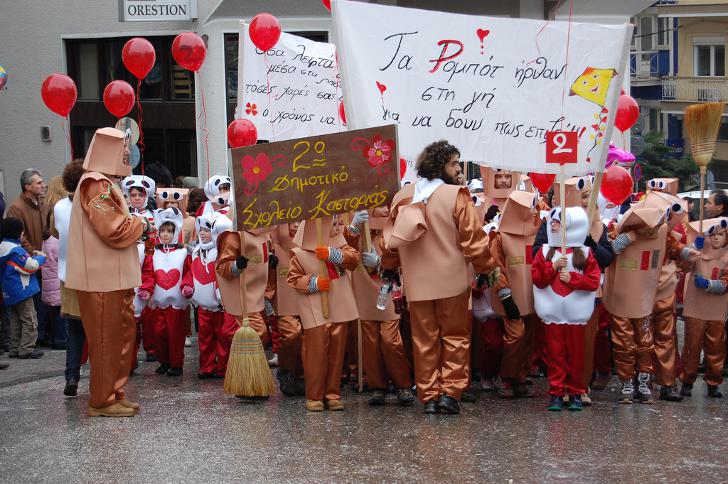The Ragoutsaria carnival dates back to pagan times, it’s a mix of ancient Greek and Balkan traditions. It is believed to be related to the Dyonisia, a large festival in ancient Athens in honor of Dionysus, the god of the wine and winemaking, grape harvest, ritual madness, and fertility. The rural Dyonisia took place in the month of Poseidon, which corresponds to late December and early January. The word “ragoutsaria” is derived from the Latin word “rogatores” which means “beggars”. It reminds us what the festival was initially all about. People dressed up in bizarre costumes and went around the city, dancing and knocking at the doors to ask for wine, food and money. Locals believed that offerings of food, money and wine would chase evil spirits away from their homes.
The Ragoutsaria carnival begins on January 6, the feast of Epiphany in Western Christianity (although Greeks are Orthodox Christians, Greece uses the Revised Julian calendar which coincides with the Gregorian calendar employed by Western churches). The Greeks call this feast Theophany. After the Great Blessing of Waters, hundreds of locals donning costumes flood the streets and go from door to door, accompanied by musicians playing traditional Balkan music. Modern revelers don’t beg for food or money, they just want to make people come out of their homes and participate in the festivities.
The festivities culminate on January 8 with a grand carnival parade. On this day men and women, young and old dress up to participate in the parade known as bouloukia. The parade ends at Doltso (also spelled as Dolcho), a medieval quarter with a large square which played an important role in uniting people and maintaining Greek traditions during the Turkish occupation.
At Doltso, all participants and spectators, locals and tourists alike, start partying. Each parade unit (at Ragoutsaria they are known as “crowds”) tries to out-sing each other. There’s plenty of food, wine, traditional music and dancing, contests and competitions, and more.
In 2021, the event was held online due to the coronavirus pandemic.

Photo by Mouzenidis Group



